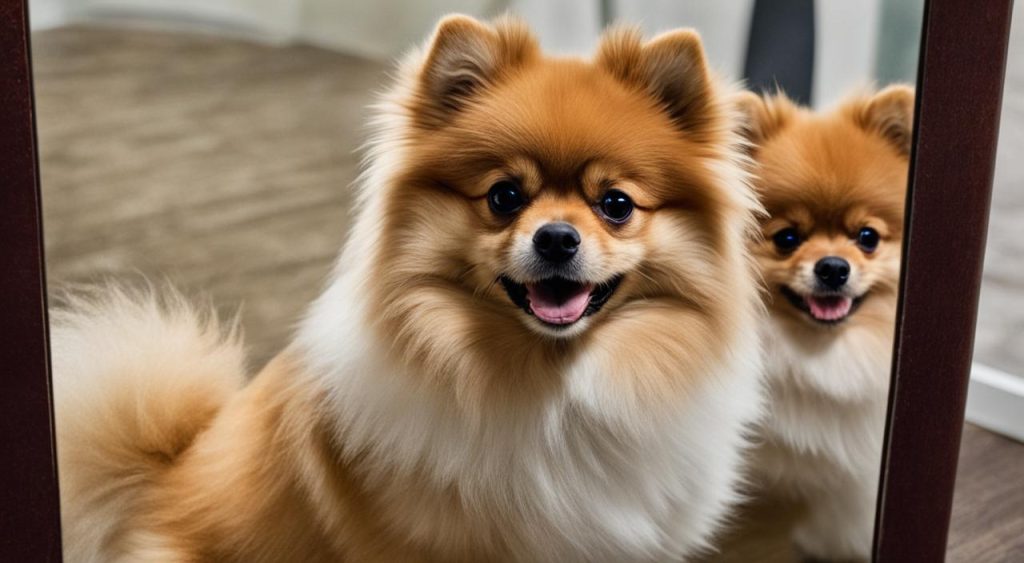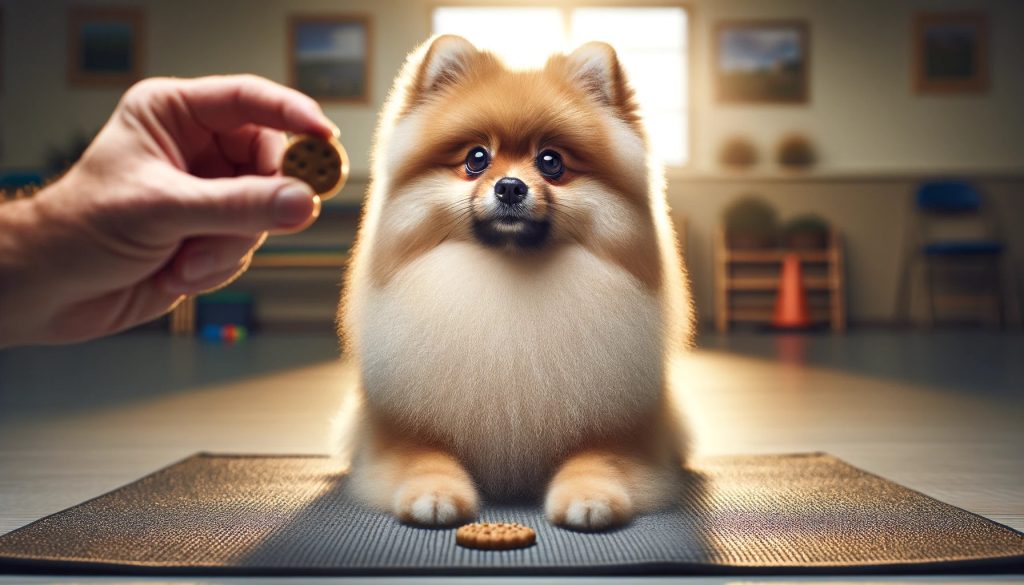Pomeranians are known for their lively and spirited temperament. According to the AKC Standard, they are described as inquisitive, cocky, and animated. These tiny dogs possess a sharp eye and are keenly alert to approaching strangers, making them excellent alarm dogs. However, it is crucial to socialize them early to prevent them from becoming sharp or shrill.
While most Pomeranians get along well with other pets, some may display bossy behavior. Their intelligence is undeniable, but they may not always take orders, especially from those they perceive as less important. Therefore, this breed may not be recommended for families with young children as they can be prone to mischief and do not appreciate rough handling.
Key Takeaways:
- Pomeranians have a lively and spirited temperament.
- They are inquisitive, cocky, and animated according to the AKC Standard.
- Socialization is important to prevent sharp or shrill behavior.
- Some Pomeranians may display bossy behavior towards other pets.
- They are intelligent and may not always take orders from everyone.
Pomeranian Personality Traits
The Pomeranian breed is known for its perky and friendly personality, despite its small size. These dogs have a larger-than-life attitude that often surprises people. They may even boldly approach and challenge larger dogs, both physically and vocally. This confident behavior showcases their spirited nature and fearlessness, making them stand out among other small dog breeds.
Not only are Pomeranians active and energetic, but they are also highly intelligent. They thrive on mental stimulation and enjoy learning new tricks and commands. Their sharp minds make them quick learners and eager participants in training sessions.
However, Pomeranians can also be independent at times, showing a stubborn streak. It’s important to approach their training with patience and consistency to overcome any challenges. With the right guidance and positive reinforcement, their independent nature can be harnessed, leading to a well-behaved and obedient companion.
“Despite being small, Pomeranians have a fiery spirit and a strong sense of loyalty towards their owners.”
Excessive barking can be a common behavior trait in Pomeranians. This may stem from their alert and protective nature, as they make excellent watchdogs. Proper training and socialization from an early age can help curb this behavior and ensure that their vocal tendencies are channeled appropriately.
When it comes to socializing with other pets, Pomeranians generally get along well. Their friendly nature allows them to coexist harmoniously with other animals, making them a great addition to multi-pet households. However, as with any breed, individual personalities can vary, so introductions should always be done gradually and under supervision.
Pomeranian Care and Considerations
Pomeranians are relatively easy to care for but have a few considerations. It’s important to understand their behavior and temperament issues to provide the best care for them.
Diet and Eating Habits
Some Pomeranians can be finicky eaters, so it’s crucial to find a diet that works for them. Consult with a veterinarian to develop a balanced and nutritious meal plan tailored to your Pomeranian’s specific needs. Regular feeding schedules and portion control are also essential to prevent overeating and maintain a healthy weight.
Exercise and Mental Stimulation
Pomeranians may be small, but they still require regular exercise and mental stimulation to keep them happy and healthy. Even short walks around the block or playtime in a fenced yard can help to burn off energy and stimulate their minds. Engaging them in interactive toys or puzzle games can also provide mental enrichment.
Grooming and Coat Care
Pomeranians have a double coat that needs regular grooming to prevent matting and maintain its health and appearance. Brush their coat at least once a week, using a slicker brush or comb to remove tangles and mats. Regular bathing is also necessary, but be sure to use a gentle dog shampoo to avoid drying out their skin. Trimming their nails, cleaning their ears, and brushing their teeth are also important aspects of their grooming routine.
Health and Dental Care
While Pomeranians are generally healthy dogs, they can be prone to dental issues. Regular dental care, including brushing their teeth and providing dental chews or treats, can help prevent dental problems. Routine vet check-ups are also crucial to monitor their overall health and catch any potential issues early on.
Training and Socialization
Pomeranians may be prone to excessive barking if not properly trained and socialized. Early obedience training and social exposure to various situations, people, and other animals are essential to prevent behavioral issues. Positive reinforcement techniques, such as rewards and praise, work best with their intelligent nature.
By understanding Pomeranian behavior, addressing their temperament issues, and following these care considerations, you can ensure that your Pomeranian lives a happy, healthy, and fulfilling life.
Conclusion
In conclusion, Pomeranians are known for their lively and spirited temperament. They are intelligent and alert, making them superb alarm dogs. However, it is important to address their potential for excessive barking through proper training and socialization. Despite this, Pomeranians generally have a friendly nature and can get along well with other pets.
When it comes to Pomeranian care, regular exercise and grooming are key to keeping them happy and healthy. They may be small in size, but they have a larger-than-life personality that can bring immense joy to the right owner.
Before considering adding a Pomeranian to your family, it’s essential to consider their temperament, behavior, and specific care requirements. With the right understanding and commitment to their needs, Pomeranians can make fantastic companions and bring endless love and delight into your life.





